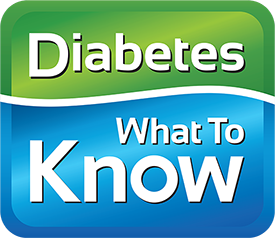If you’ve just been diagnosed with diabetes, it can feel scary and overwhelming. You may think about someone you know who has had some serious health problems because of diabetes. This article offers some basic information about diabetes along with eight tips to help you live a long and healthy life.
The Basics:
While there are different types of diabetes, type 2 diabetes is the most common. It is a condition that occurs when the blood glucose (also called blood sugar) is too high. Blood glucose is the main source of energy and comes mainly from food. Insulin, a hormone made by the pancreas, helps move the glucose from food into the cells so it can be used.
In type 2 diabetes, the body does not make enough insulin, or it is not using the insulin well. This results in too much glucose in the blood and not enough going into the cells. Over time, high blood sugar can be damaging to the body and can result in different problems including heart, eye, kidney and nerve disease.
The treatment for diabetes is very individualized, but a healthy eating and exercise plan should be part of everyone’s treatment plan. Most people diagnosed with diabetes are prescribed medicine, but there are many different kinds. You may be taking a pill, or taking an injection, or a combination of the two. If you carry excess weight, losing some weight will be helpful for lowering blood glucose. While diabetes can’t be “cured” – for some people, it can go into remission, where no medicines are needed and blood glucose stays in target range.
Tips To Get Started:
Relax. Take a deep breath. Know that a long and healthy life is possible with diabetes, as long as you learn about it and don’t ignore it.
Get the facts. Reading this article is a great first step. Well-meaning friends and family may offer you lots of advice, but it’s best to get the facts from your medical providers, a diabetes care and education specialist or trustworthy sources such as Diabetes What to Know or the American Diabetes Association (ADA).
Know your numbers. The best way to know how your diabetes is doing is by knowing your “A B Cs” – the results of three important tests: your A1C, Blood pressure and Cholesterol. The A1C is a measure of your average blood sugar levels and the goal for most people is for that number to be below 7. Blood pressure and cholesterol levels should also be in the target range as they are a measure of the health of your heart and blood vessels, which can be linked with diabetes.
It’s also recommended to check your blood sugar levels at home, either with a home meter or by wearing a continuous glucose monitor. Aim for fasting (before meal) glucose numbers between 80-130 and shoot for numbers below 180 two hours after a meal. Talk with your healthcare provider about what your ABC goals should be, as well as your glucose goals.
Create your support team. Most primary care providers provide excellent diabetes care. It’s important to have a PCP with whom you feel you can speak openly and honestly, and who takes your diabetes seriously. Otherwise, you may want to look for a different provider. There may be other team members your provider would like you to work with during your journey, including a dietitian, an exercise physiologist, or a diabetes care and education specialist.
Get a meal plan. It is recommended that everyone with diabetes meet with a registered dietitian nutritionist (RDN) to get personalized guidance for how to eat. If meeting with an RDN is difficult, check out this video on healthy eating tips, our meal planning guide, and learn about the plate method here. You can also check out the ADA’s Diabetes Food Hub here.
Seek out an education program. Talk with your diabetes care provider to help you find a diabetes education program so you (and your loved ones) can learn about living well with diabetes. There are many options offered through hospital systems, health departments and even online. Most are covered by insurance, but be sure to ask ahead of time.
Take medicines as prescribed. Diabetes medicines are an important part of most treatment plans. If you’ve been prescribed a medicine, it is important that you take it exactly as prescribed. If you have any concerns (is it too expensive? Inconvenient?) or experience any side effects, talk with your diabetes care provider about other options.
Be a lifelong learner. New research is always bringing improvements to diabetes treatment, and potential problems can be caught earlier. Keep up to date with new information from trustworthy sources by attending education programs and talking with your diabetes care team. Stay on top of your own diabetes by keeping your medical appointments, having preventive checks (like an annual eye exam and regular foot screenings) and keeping a list of questions so you are prepared for your medical appointments. (Get more tips here.)
Sign up for our free diabetes education class here.
If you’d like to join a diabetes support group to learn and share with others, click here.
The medical information on Diabetes – What To Know’s website is provided as an information resource only. The content is not in any way intended to be nor should you rely on it as a substitute for professional medical evaluation, diagnosis, advice and treatment.

